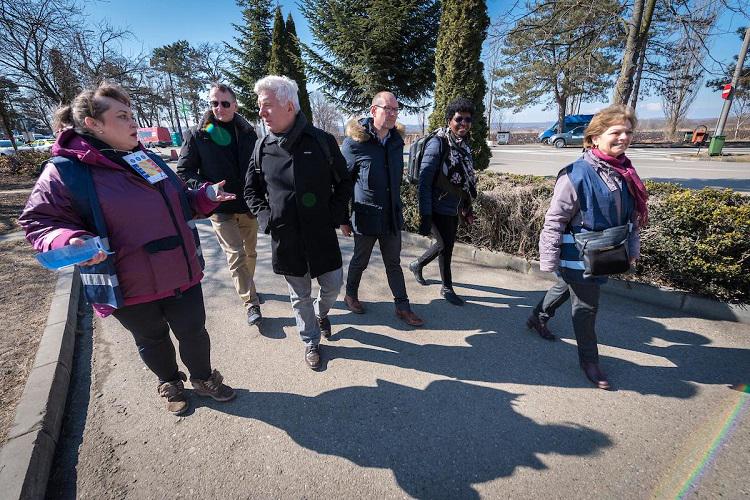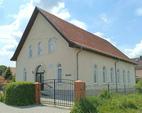Meeting with Hungarian Inter-Church Aid, the delegation visited refugee centers in Budapest, then held a roundtable meeting with ecumenical partners in Hungary.
The group also visited the Ukraine and Romanian border to see the work done by Hungarian Inter-Church Aid in support of refugees.
The delegation also connected with Aidrom, making border visits and learning about the rapidly-changing needs of refugees.
The delegation was also received by His Eminence Father Iustin, bishop of Maramuresh and Satmar of the Romanian Orthodox Church, learning about the situation at two crossing points for Ukrainian refugees.
His Eminence Iustin explained to them that the Romanian Orthodox Church is very dynamically and actively involved in the reception and in taking Christian care of all those crossing the border into Romania, whether they stay or transition freely on the way to western countries. The Ukrainian refugees are provided with medicines, food, clothes, accommodation or guidance to destinations.
An important facet of care at these crossing points comes from priests and volunteers who show love, warmth and generosity.
The Petrova Monastery is hosting more than 50 mothers with children for an indefinite period, providing accommodation, meals and other care. Through collaboration with the educational authorities and institutions, children are also given the opportunity to attend school and learn in their native language within the Ukrainian communities in the area.
The Romanian Orthodox Church is also joining many other Christians across the world in praying for peace.
WCC deputy general secretary Prof. Dr Isabel Apawo Phiri said that meeting with refugees and those helping them was a sharp reminder of the appalling and escalating impact of the conflict in Ukraine on civilians. “The women, men and children of Ukraine are suffering from what appears to be ongoing indiscriminate attacks,” she said. “Hospitals, schools, kindergartens and residential areas—refugees are pouring forth from these spaces with firsthand stories of deep trauma.”
Peter Prove, director of the WCC Commission of the Churches on International Affairs, said that, as international humanitarian law continues to be disregarded, civilians are bearing the brunt of the conflict. “It is deeply disturbing to witness the effects of what may constitute war crimes and crimes against humanity,” said Prove. “Humanitarian aid groups and churches are unified in calling for a ceasefire and negotiations to end this tragic conflict.”
Rudelmar Bueno de Faria, general secretary of ACT Alliance, spoke on the second day of the visit, as the delegation met with Hungarian Inter-Church Aid. “At the airport, they have a welcome center and also, around Budapest, different places where they are providing all kinds of support for Ukrainian refugees,” said de Faria. “By today, you have more than 3 million refugees in neighboring countries, and we will be visiting and talking and checking how is the situation of them and the challenges they face in this war.”
More photos of the solidarity visit by ACT Alliance and WCC
Originally from the World Council of Churches
CCD reprinted with permission.












